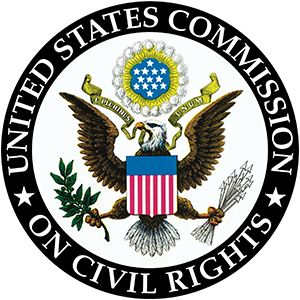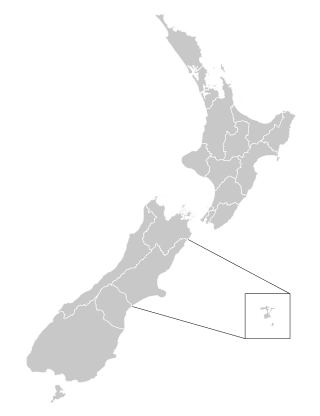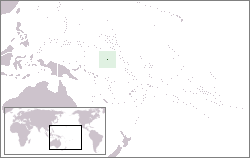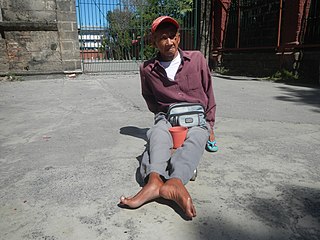Katherine Victoria O'Regan was a New Zealand politician. She was a member of parliament from 1984 to 1999, representing the National Party. She served as a minister for the National Government for six of those years.

The Australian Human Rights Commission is the national human rights institution of Australia, established in 1986 as the Human Rights and Equal Opportunity Commission (HREOC) and renamed in 2008. It is a statutory body funded by, but operating independently of, the Australian Government. It is responsible for investigating alleged infringements of Australia's anti-discrimination legislation in relation to federal agencies.

The U.S. Commission on Civil Rights (CCR) is a bipartisan, independent commission of the United States federal government, created by the Civil Rights Act of 1957 during the Eisenhower administration, that is charged with the responsibility for investigating, reporting on, and making recommendations concerning civil rights issues in the United States. Specifically, the CCR investigates allegations of discrimination based on race, sex, national origin, disability. Since 2021, Norma V. Cantu has served as chair of the CCR.

District health boards (DHBs) in New Zealand were organisations established by the New Zealand Public Health and Disability Act 2000 under the Fifth Labour Government, responsible for ensuring the provision of health and disability services to populations within a defined geographical area. They existed from 1 January 2001, when the act came into force, to 30 June 2022. Initially there were 21 DHBs, and this was reduced to 20 organisations in 2010: fifteen in the North Island and five in the South Island. DHBs received public funding from the Ministry of Health on behalf of the Crown, based on a formula that took into account the total number, gender, age, socio-economic status and ethnic mix of their population. DHBs were governed by boards, which were partially elected and partially appointed by the minister of Health.
The Human Rights Commission is the national human rights institution (NHRI) for New Zealand. It operates as an independent Crown entity, and is independent from direction by the Cabinet.

Brian Leslie HoweAO is a retired Australian politician and Uniting Church minister. He served as Deputy Prime Minister of Australia and deputy leader of the Labor Party from 1991 to 1995, under Bob Hawke and Paul Keating. He was a government minister continuously from 1983 to 1996, and a member of the House of Representatives from 1977 to 1996, representing the Division of Batman in Victoria.
The Health And Disability Commissioner is a New Zealand Crown entity responsible for promoting and protecting the rights of health and disability services consumers, and facilitating the fair, simple, speedy, and efficient resolution of complaints.

Paul Steven Miller was the Henry M. Jackson Professor of Law at the University of Washington School of Law. He was a Commissioner of the Equal Employment Opportunity Commission (EEOC) for almost 10 years, and in 2009 he was chosen to serve as a special assistant to President Barack Obama. Miller, who had the genetic condition achondroplasia was 4 feet 5 inches (135 cm) tall. He was known as a leader in the disability rights movement, and an expert on anti-discrimination law and international disability rights.
Euthanasia became legal in New Zealand when the End of Life Choice Act 2019 took full effect on 7 November 2021. It is illegal to "aid and abet suicide" under Section 179 of the New Zealand Crimes Act 1961. The clauses of this act make it an offence to "incite, procure or counsel" and "aid and abet" someone else to commit suicide, regardless of whether a suicide attempt is made or not. Section 179 covers both coercion to undertake assisted suicide and true suicide, such as that caused by bullying. This will not change under the End of Life Choices Act 2019, which has provisions on coercion of terminally ill people.

Human rights in New Zealand are addressed in the various documents which make up the constitution of the country. Specifically, the two main laws which protect human rights are the New Zealand Human Rights Act 1993 and the New Zealand Bill of Rights Act 1990. In addition, New Zealand has also ratified numerous international United Nations treaties. The 2009 Human Rights Report by the United States Department of State noted that the government generally respected the rights of individuals, but voiced concerns regarding the social status of the indigenous population.
Nursing home residents' rights are the legal and moral rights of the residents of a nursing home. Legislation exists in various jurisdictions to protect such rights. An early example of a statute protecting such rights is Florida statute 400.022, enacted in 1980, and commonly known as the Residents' Rights Act.
The Office of the Children's Commissioner was an independent New Zealand Crown entity that was established under the Children's Commissioner Act 2003. Its role has been superseded by Mana Mokopuna - Children and Young People's Commission. OCC's main responsibilities were to protect the rights, health, welfare, and wellbeing of minors under the age of 18 years.

Lesbian, gay, bisexual, and transgender (LGBT) people living in Nauru may face legal and social challenges not experienced by non-LGBT persons. Same-sex sexual activity has been legal since May 2016, but there are no legal recognition of same-sex unions, or protections against discrimination in the workplace or the provision of goods and services.
The Human Rights Review Tribunal is a statutorily established institution fundamental to the application, determination and up holding of human rights in New Zealand. The tribunal is established under the New Zealand Human Rights Act 1993. The Human Rights Review Tribunal is one of two key human rights bodies in New Zealand and provides the mechanism for adjudication and resolution of human rights issues. The jurisdiction of the tribunal extends to cover matters from domestic human rights law, principles given in the Privacy Act 1993 and the Health and Disability Commissioner Act 1994. Complaints may be bought by the Director of Human Rights or where it is deemed not appropriate to do so, a citizen may proceed with a claim at their own cost. The tribunal has the power to grant a wide range of remedies and in making a determination, is not required to give effect to technicalities but rather, the substantial merits of the case. The Human Rights Review tribunal also holds special status within the array of tribunals in New Zealands domestic legal system, with a far more significant legal jurisdiction than other inter partes tribunals. This special status reflects the fact that decisions of the tribunal can have substantial political and societal implications.
Local government bodies in New Zealand have responsibilities under the Local Government Act 2002 (LGA) to perform a wide range of functions, and provide a wide range of services to the communities they represent. There is not an explicit focus on human rights in New Zealand local government, or any direct reference to human rights under the LGA. Local bodies in New Zealand are required to act in a way that is consistent with the rights guaranteed under the New Zealand Bill of Rights Act 1990 (NZBORA). Internationally there is growing consideration of how local government does and could promote and protect fundamental rights.
The rights of mental health patients in New Zealand are covered in law by both the New Zealand Bill of Rights Act 1990 and The Code of Health and Disability Service Consumers' Rights. Section 11 of the Bill of Rights Act states that "everyone has the right to refuse to undergo any medical treatment". However the Mental Health Act 1992 allows for the compulsory treatment of patients with major mental illness who do not consent. This legislation also allows for the detention and treatment of individuals who have committed crimes but who have either been deemed unfit to plead or have been found not guilty by reason of insanity.
The authority for patient rights in New Zealand comes from the Health and Disability Commissioner Act 1994, the specific rules come from Health and Disability Commissioner Regulations 1996. This code improves the quality of healthcare in New Zealand and ensures that there is a consistent expectation for all consumers.

Climate change disproportionately affects individuals with disabilities, both directly and indirectly. Individuals with disabilities are more likely to experience the effects of climate change on humans more acutely compared to those without disabilities. Typically, disabled people are the most likely to be negatively affected by any form of emergency, whether it be an immediate emergency like a flood or tornado or a gradual emergency like rising sea levels, due to a lack of access to emergency resources and the difficulties imposed by limited mobility. Disabled people are also more adversely affected by climate change because a disproportionate number of disabled people live in poverty, and people living in poverty are inherently more at risk due to climate change. Despite this, and despite the fact that disabled people make up more than 15% of the global population, they have had minimal input and involvement in the decision-making process surrounding responses to climate change. A 2022 study by the Disability-Inclusive Climate Action Research Programme revealed that only 37 of 192 State Parties to the Paris Agreement currently refer to persons with disabilities in their nationally determined contributions, while only 46 State Parties refer to persons with disabilities in their domestic climate adaptation policies.








